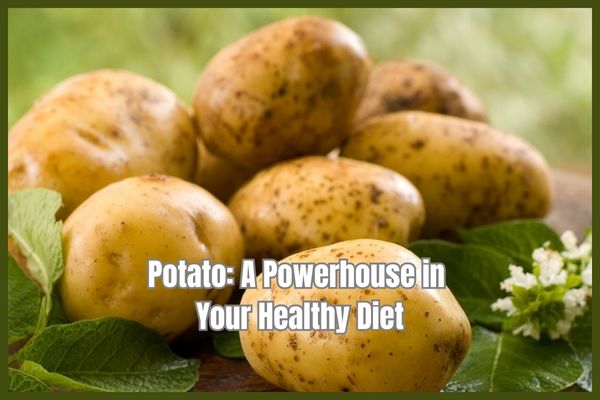Potato: A Powerhouse in Your Healthy Diet
Potatoes have long been a dietary staple, offering not just comfort but also a plethora of health benefits. Let’s dive into the nutritional value of this versatile vegetable and explore how it contributes to a balanced and wholesome diet.
Introduction to Potatoes
Potatoes, often overlooked, are an integral part of various cuisines worldwide. They come in different varieties, each with its unique texture and taste. Despite misconceptions, potatoes offer numerous health advantages when consumed in moderation.
Nutritional Value of Potatoes

Macronutrients in Potatoes
Potatoes are rich in carbohydrates, providing a sustainable source of energy. They are also low in fat and sodium, making them an excellent addition to a balanced diet.
Vitamins and Minerals
Loaded with essential vitamins like Vitamin C and B6, along with minerals such as potassium and manganese, potatoes contribute significantly to meeting daily nutritional requirements.
Health Benefits of Potatoes
Digestive Health
The dietary fiber in potatoes aids in proper digestion, promoting a healthy gut and preventing digestive issues.
Heart Health
Potatoes contain compounds that support heart health by regulating cholesterol levels and reducing the risk of heart disease.
Blood Pressure Regulation
Potassium-rich potatoes assist in regulating blood pressure, contributing to overall cardiovascular well-being.
Incorporating Potatoes into a Healthy Diet
Cooking Methods
Opt for healthier cooking methods like baking, boiling, or roasting to retain the nutritional content of potatoes while minimizing added fats.
Portion Control
Balancing portion sizes ensures enjoying the benefits of potatoes without excessive calorie intake.
Dietary Fiber in Potatoes
Importance of Fiber in Diet
Adequate fiber intake is crucial for digestive health, weight management, and maintaining stable blood sugar levels.
How Potatoes Fulfill Fiber Needs
Potatoes, especially when consumed with the skin, provide a significant amount of dietary fiber, aiding in meeting daily requirements.
Potatoes and Nutrient Density
Comparing Nutrient Density
Despite misconceptions, potatoes boast impressive nutrient density compared to many other starchy foods.
Role in a Balanced Diet
When incorporated sensibly, potatoes complement a balanced diet by offering essential nutrients and contributing to overall health.
Misconceptions about Potatoes
Addressing Carb Concerns
Contrary to popular belief, the carbohydrates in potatoes serve as an important energy source and are not inherently unhealthy.
Debunking Unhealthy Associations
Disassociating potatoes from unhealthy preparations like fried chips emphasizes their nutritional value when cooked healthily.
Conclusion
In conclusion, potatoes are a valuable addition to a healthy diet, providing an array of nutrients and health benefits when prepared mindfully.
Potato is a versatile vegetable that can be cooked in many different ways. Some popular potato recipes include:
Mashed potatoes: Boil potatoes until tender, then mash with butter, milk, and salt and pepper to taste.
French fries: Cut potatoes into thin strips, then deep fry until golden brown.
Roasted potatoes: Cut potatoes into chunks, then toss with olive oil, salt, and pepper. Roast in a preheated oven at 400 degrees Fahrenheit (200 degrees Celsius) until tender.
Potato salad: Boil potatoes until tender, then dice and add to a bowl with mayonnaise, celery, onion, and salt and pepper to taste.
Hash browns: Grate potatoes, then cook in a skillet with butter or oil until golden brown.
Potatoes au gratin: Slice potatoes thinly, then layer in a baking dish with cream, cheese, and salt and pepper to taste. Bake in a preheated oven at 350 degrees Fahrenheit (175 degrees Celsius) until bubbly and golden brown.
Potato soup: Sauté onions and garlic in a pot, then add potatoes, broth, and milk. Bring to a boil, then simmer until potatoes are tender. Puree or blend until smooth.
Potato pancakes: Grate potatoes, then mix with eggs, flour, and salt and pepper to taste. Cook in a skillet with butter or oil until golden brown.
Twice-baked potatoes: Bake potatoes in a preheated oven at 400 degrees Fahrenheit (200 degrees Celsius) until tender. Scoop out the flesh, then mix with butter, milk, cheese, and salt and pepper to taste. Refill the potato skins with the mixture and bake until golden brown.
Shepherds pie: Cook ground beef with onions and garlic. Add potatoes, carrots, and peas. Pour in beef broth and bring to a boil. Simmer until potatoes are tender. Top with mashed potatoes and bake in a preheated oven at 350 degrees Fahrenheit (175 degrees Celsius) until golden brown.
These are just a few of the many delicious potato recipes that are out there. With a little creativity, you can come up with your own unique potato dishes.
FAQs
- Q-Are potatoes fattening?
A-Potatoes themselves aren’t fattening; it’s the preparation and portion size that affect their impact on weight. - Q-Do potatoes lack nutrients?
A-No, potatoes contain essential vitamins, minerals, and fiber, contributing to a well-rounded diet. - Q-Can I eat potatoes if I’m on a low-carb diet?
A-Moderation is key; opt for smaller portions and healthier cooking methods if following a low-carb plan. - Q-Are sweet potatoes healthier than regular potatoes?
A-Both offer unique nutritional benefits; sweet potatoes tend to be higher in certain vitamins, but both are nutritious. - Q-Can I eat potato skin?
A-Yes, potato skin contains a significant portion of the vegetable’s fiber content; just ensure proper washing before consumption.
Dark Chocolate: Amazing Health Benefits of This Decadent Treat!